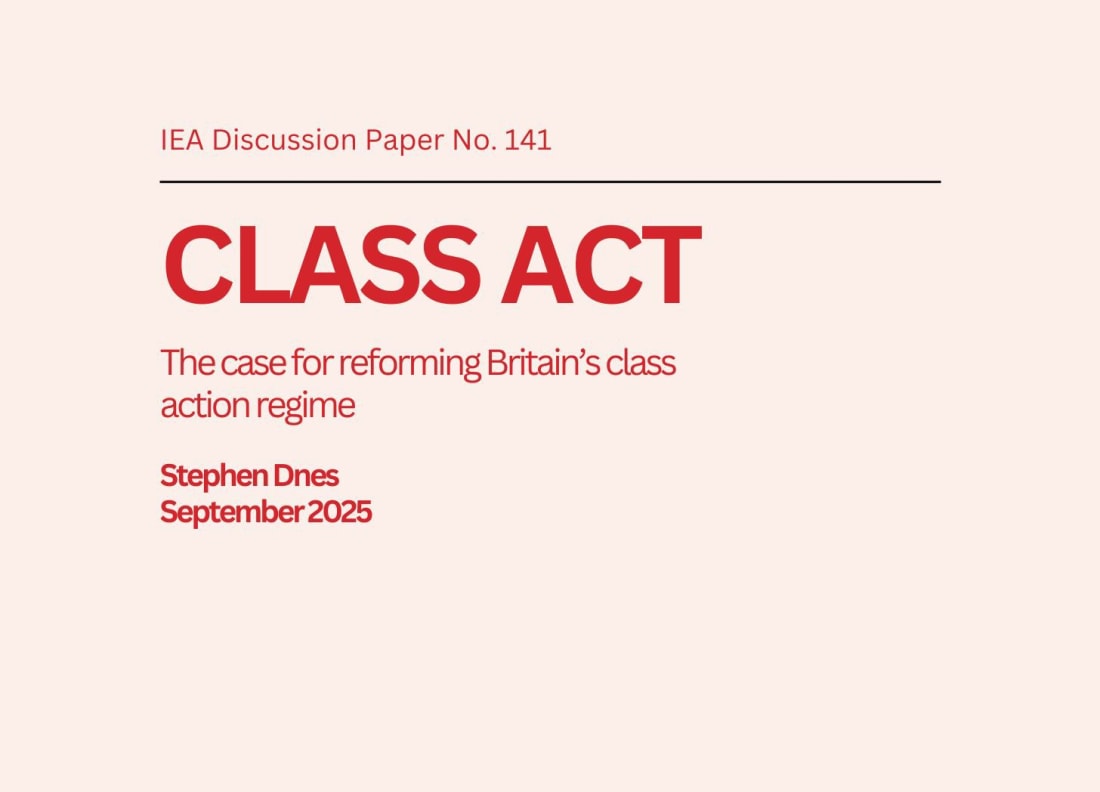|
By Stephen Dnes
Recent years have seen sharp growth in the number and scale of class actions filed before the UK Competition
Appeal Tribunal (‘Tribunal’). Pending claims are worth an estimated £134 billion. There are 655 million claimants, that is, ten claims per person. On average, there is roughly one new class action every week.
The sudden increase in the scope of claims raises questions about their quality. The strong economic case against hardcore cartels applies equally to private litigation, but there are also some more adventuresome cases which stray from true cases of economic harm. Such cases increase costs and could harm innovation.
Three specific concerns arise: (1) Cases are not getting much money, even against hardcore cartels; (2) Some low-quality cases have crept in, but they are mixed up with stronger ones which ought not to be undermined by reform; (3) Cases are very slow.
This paper explores five related policy options to address these three issues. They can be used together or in isolation to focus cases onto the stronger ones and away from the weaker ones. The proposals span several major aspects of the cases and would significantly focus their remit.
There are ten class action claims per person pending in the UK today, with a total valuation of approximately £134bn
They can provide important recourse to justice, but some cases reward funders and lawyers, not consumers
Proliferation of cases could cost UK economy up to £18bn, diverting resources away from innovation and undermining growth
As the Government reviews the system, new proposals are published today that would force funders to make early payouts to claimants, consolidate losses, and focus on economically sound cases
Britain’s class action regime risks becoming a drag on growth, imposing billions in costs while delivering little for consumers, according to a new paper published by the Institute of Economic Affairs today.
The report – Class Act: The case for reforming Britain’s class action regime by competition lawyer Stephen Dnes – warns that the UK’s opt-out system introduced in 2015 has seen an explosion of speculative lawsuits. Pending claims are valued at £134 billion, with around one new class action filed each week.
Cases often deliver little compensation to consumers but offer big returns for funders and lawyers. In Merricks v Mastercard, at one point a funder tried to offer just 48p each so that funders and lawyers could have £179m of the final £200m settlement.
While strong cases against cartels are justified, the incentives between the parties - including claimants, law firms, and funders - don’t always align under the current system, which can lead to perverse outcomes. There has reportedly been an 'exodus of key lawyers' from the law firm Pogust Goodhead suing in the Fundao dam case, one of the biggest class action cases in the UK, after clashes with third-party funders. Perverse incentives can also lead to weak and speculative claims proliferating alongside stronger ones, and cases dragging on for years.
This is carrying a substantial economic cost by slowing innovation, driving up business costs, and undermining growth. A recent analysis by the European Centre for International Political Economy suggests such litigation could cost the economy as much as £18 billion, including £11 billion in lost market capitalisation for innovative firms. Money that would otherwise go towards innovation, lower prices, or returns on investment for shareholders, is instead set aside for legal costs.
The Government currently has an open call for evidence to look at potential reforms. Today's report proposes a package of tangible proposals to focus the regime on strong, economically justified cases:
Seed payouts to claimants before certification – filtering out weak cases by requiring funders to put money into claimants’ hands upfront.
A market for claims – letting rival funders compete to deliver better payouts.
Sharper economic tests at certification – ensuring only cases that show real market harm proceed.
Consolidation of losses – preventing wasteful supply chain disputes.
Hands-off approach to funder returns – avoiding perverse incentives to delay and ensuring money flows to claimants, not lawyers.
These changes would sharply reduce speculative litigation and ensure class actions deter anti-competitive behaviour without stifling innovation or burdening the economy with unnecessary costs.
Leading competition lawyer and author of the report Stephen Dnes said:
“Class actions can play a vital role in detering anti-competitive behaviour and protecting consumers, but the UK’s regime has gone off course. There is a real risk of friendly fire especially when innovative companies are sued. It is time for a course correction.”
“The system can be fixed, by fixing the misaligned incentives built into the system, to restore focus on genuine harm, speed up justice, and support growth.”
You’re currently a free subscriber to Insider. For the full experience, upgrade your subscription.
Paid subscribers support the IEA's charitable mission and receive special invites to exclusive events, including the thought-provoking IEA Book Club.
We are offering all new subscribers a special offer. For a limited time only, you will receive 15% off and a complimentary copy of Dr Stephen Davies’ latest book, Apocalypse Next: The Economics of Global Catastrophic Risks.
